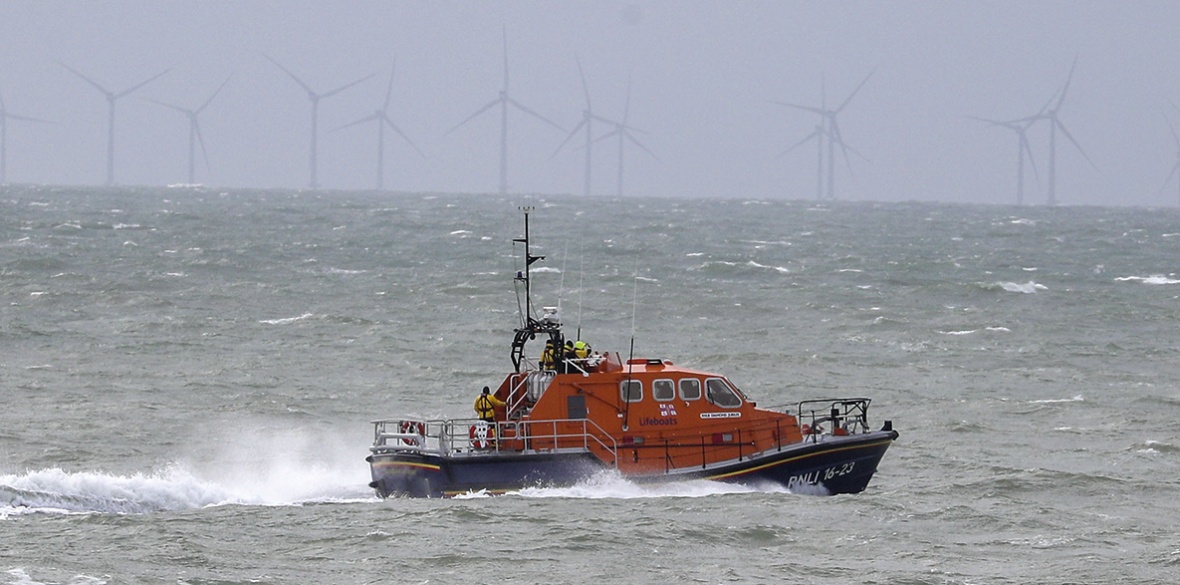This is the last article you can read this month
You can read more article this month
You can read more articles this month
Sorry your limit is up for this month
Reset on:
Please help support the Morning Star by subscribing here
LAST week’s attack on the Royal National Lifeboat Institution (RNLI) instigated by culture warriors such as Nigel Farage and Darren Grimes may well mark the moment that the populist and nationalist right’s attempts to “jump the shark” backfire and expose them for the racist creatures they really are.
In many ways it’s an incredibly strange choice of target for those desperate to wrap themselves in the union flag, and reminisce about the good old days before “woke liberals” wrecked Britain, because it’s actually quite hard to think of an organisation whose public image is as quintessentially British as the RNLI.
Founded in 1824 as the National Institution for the Preservation of Life from Shipwreck, the institution quickly gained royal patronage, adopting its current name in 1860, and the current monarch remains a patron.
While the union flag doesn’t form part of the RNLI ensign (in part due to its enduring role in the Republic of Ireland), its offshore boats are blue with red and white lining, though obviously now with a significant amount of high-vis orange.
Those same boats in many cases bear names of long dead industrialists, and other “worthies” whose legacies provide the institution with the majority of its income, the vast amount of the remainder coming from fundraising and by the more than 1,000 branches, which usually evokes thoughts of cake bakes, jam sales and garden fetes.
During WWII when apparently in the eyes of the culture warriors “Britain stood alone,” the RNLI was at the forefront of the Dunkirk evacuations and air sea rescue actions.
Lastly, of course, for the lovers of “small state” provision it provides a vital national service at absolutely zero cost to the taxpayer, unlike the situation in both the US and Canada where this function falls to the coastguard.
It would be wrong, however, to see the RNLI as just a microcosm of the British class system at work.
There is an egalitarianism and collectivism in its approach to both operations and fundraising.
It would be very wrong to see the fundraising efforts as simply the work of posh ladies who lunch — it’s the work of many thousands of dedicated volunteers from myriad different backgrounds to deliver the upwards of £50 million a year raised in this way.
The first woman volunteer joined an inshore crew in 1969, making it something of a pioneer for equality and inclusion in Britain.
Since 2000 the RNLI has maintained a fleet of six boats dedicated to international flood relief — perhaps that too shocks the culture warriors.
Crews are picked based on skill and aptitude. During my time as a launcher and land rover driver at an inshore lifeboat station, the operational volunteers boasted a civil servant, a solicitor, a small business owner, a McDonald’s worker, a policeman, two beach patrol officers, a civil servant, a retired railway worker and an inshore fisherman.
The two helm positions were occupied by one of the beach patrol officers and the inshore fisherman, both recipients of the RNLI’s bronze medal for gallantry.
We certainly came from different backgrounds, we certainly held a wide variety of political opinions, but what united us was a belief in saving lives at sea, regardless of age, race, gender or class.
From my time as a volunteer, when the bleeper went, instigating the headlong run down to the boathouse, I can say with some certainty that what goes through your mind isn’t an internal debate about who the casualty is, or how they got there, and whether they should be rescued.
When you’re holding a boat’s head to sea at 2 o’clock in the morning, with waves breaking around your shoulders, your first concern is whether you can locate the casualty in the pitch dark, not whether it’s a tourist who’s had too much to drink, a yachtsman or a refugee.
To suggest any sort of selective approach to saving lives at sea isn’t just inhumane, it’s frankly damn stupid too.
In its 197-year history the RNLI has saved in the region of 140,000 lives at sea and (whisper it quietly lest it cause a further affront to our embittered culture warriors) among that number were German seamen and airmen rescued during two world wars.
Over 600 crew members have given their lives in that time, simply because they could not stand by and see others drown. I remain immensely proud of the time I spent as a volunteer.
Like any large organisation, the RNLI isn’t perfect, but it does not deserve to find itself at the forefront of today’s ludicrous “war on woke.”
Its current mission statement makes very clear what its role is and continues to be: “We value every life and look to prevent loss of life, whoever it may be and wherever they may be in trouble.”
This isn’t being woke, this is being humane. I’m no fan of the new watchword “All lives matter,” but the RNLI is an organisation that clearly lives by that phrase in a very real and humane sense, and in doing so shows the real meaning behind those who parrot it at every opportunity. To them all lives matter, as long as they look like me.
The writer was a launcher and land rover driver at an inshore lifeboat station between 1995 and 2000.










